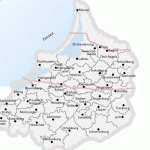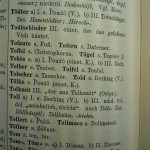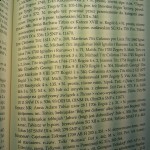Tołkiny in Bartia: nest of the Tolkien family?
(Part II)
Polska wersja tego artykułu znajduje się tutaj.
Please read also the first part of our inquiry entitled ?Does the Tolkien family come from Warmia??. In it, we write about an alternative but very likely etymology of the name Tolkien, and about the Tolkien family, who may be said to come from East Prussia, more specifically, from Bartia, and a small village called Tołkiny (Tolksdorf), lying in present-day Poland.
 He was a citizen of the Kingdom of Prussia. In 1883, he graduated from the once famous Collegium Fridericianum in what is now Kaliningrad (German: Königsberg; more about that college, which was also called Friedrichs-Kollegium in German, can be read here). One of the graduates of the college was the famous Immanuel Kant, and one of its teachers was a Polish activist, K.C. Mrongowiusz. As a classicist, who worked in Leipzig, Johannes Tolkiehn wrote, among other things, Homer und die römische Poesie (1900), Philologische Streifzüge (1916), Ars grammatica (1913, 1928). He bore almost exactly the same name as John Tolkien, an Oxford philologist.
He was a citizen of the Kingdom of Prussia. In 1883, he graduated from the once famous Collegium Fridericianum in what is now Kaliningrad (German: Königsberg; more about that college, which was also called Friedrichs-Kollegium in German, can be read here). One of the graduates of the college was the famous Immanuel Kant, and one of its teachers was a Polish activist, K.C. Mrongowiusz. As a classicist, who worked in Leipzig, Johannes Tolkiehn wrote, among other things, Homer und die römische Poesie (1900), Philologische Streifzüge (1916), Ars grammatica (1913, 1928). He bore almost exactly the same name as John Tolkien, an Oxford philologist.
Professor Johannes Tolkiehn belonged to (one of the branches of) an East Prussian family, whose members had over the centuries written down their last name as Tolkien or Tolkiehn (but also: Tolken, Tolkihn, Tolkin, Tollkiehn, Tollkien, Tollkuehn, Tollkühn; see a web page with all the German surnames). Nowadays, one of the members of this family, Prof Dr Günther-Ulrich Tolkiehn, a German scientist from Wildau (in Brandenburg), when asked in 2003 about his genealogy by a Tolkien fan nicknamed ?Almacundo?, explained the origin and etymology of his surname in the following way (a thread in TheOneRing forum). Dr Tolkien had himself conducted a preliminary survey of the library holdings, as well as genealogical research with the aim of learning about his family?s possible connections with the Tolkien family from England. What he established (as based mostly on the work of one of his distant relatives, the Reverend Heinrich Tolkiehn) is as follows:
- Relatives of the Tolkiehn family lived in East Prussia (German: Ostpreußen), which after 1945 was divided in such a way that part of it forms present-day Warmian-Masurian Province, and the rest belongs to the Kaliningrad Oblast of Russia;
- Linguistically, that historic land once inhabited by the Baltic* Prussians had since the beginning of the 13th century been part of the Low German language area (where Low Saxon and Low Franconian dialects were spoken; in the Middle Ages, their users were settlers brought to this area by the Teutonic Knights. Dutch also emerged from Low German). In East Prussia, Old Prussian and Polish dialects of Masovia were spoken. All of those language layers had an influence on personal and place names of East Prussia;
- Prof Tolkiehn claims that according to his family?s tradition, his surname was changed from Tolkien to Tolkiehn around 1800 (he holds that in his family archives there exist notes made by a member of his family, who Germanised the name, together with an exact date);
- According to Tolkiehn, the name Tolkien is typical only of the area of East Prussia, as it comes from the language of the Baltic Prussians. Many of the families living in this area bear last names ending with the suffix -ien (e.g. Leptien, Monien), but the meaning of this suffix is ? in the Professor?s view ? not thoroughly examined. What is clear, however, is the first part of the name ? Tolk. It is believed ? as we have already established in the first part of our inquiry ? to derive from Prussian, and is translated as ?interpreter?, that is a person, who in the Middle Ages was able to do trade and talk in various languages of Teutonic Prussia (and who, in particular, spoke Prutzisch/Pr?siskai, i.e. Old Prussian, and Middle Low German);
- Nowadays, a whole range of surnames already referred to (from Tolkien through different forms of Tolkiehn) includes names that are rarely met with, and are especially popular in the vicinity of Berlin, Hamburg and other cities of northern Germany, where after WWII the so-called Expellees were sent to live (those were Germans expelled from the territories that Germany lost after 1945);
- Prof Dr Günther-Ulrich Tolkiehn failed, however, to find any genealogical links between his relatives and the Tolkiehn families from Lower and Upper Saxony, from whom comes the family of J.R.R. Tolkien.

 It would certainly be vital for our research to establish in which archive sources, period of German history, federated states, and in which form the surname Tolkien appeared for the first time. If the ?Prussian theory? was proved true, we would have to examine a form/forms of the proper name (and then of the surname), which started to appear in Prussia as early as the 14th century. According to linguists like Max Mechov, it is from the Prussian *tulki (?interpreter?) that such proper names can be derived as Tuleke (1344, sołtys [mayor] of Klonowken/Klonówki near Starogard Gdański), Tolleke (1350, komtur [commander] of Elbląg), Tulicke (Sambia), Tullike (Wehlau/Welawa District in the present-day Kaliningrad Oblast), Tulke (an official of the Crown Treasury in Nehmen), Tolike (Sambia), Tolicke (1401, Warmia), Tolk (1419, Warmia), Tolck (Sambia, a Prussian peasant), Tölke (Schalwe/Sławno), as well as the surnames Tolk, Tolck, Tolks, Tollkien, Tollkiehn, Tolckien, Tolkin, Tollkühn, Tolket, Tolkemitt, Tolkmitt, Tolkemitz, Tolcomith, Tolksdorfer, Tolksdorff, Tulke, Tulkini.
It would certainly be vital for our research to establish in which archive sources, period of German history, federated states, and in which form the surname Tolkien appeared for the first time. If the ?Prussian theory? was proved true, we would have to examine a form/forms of the proper name (and then of the surname), which started to appear in Prussia as early as the 14th century. According to linguists like Max Mechov, it is from the Prussian *tulki (?interpreter?) that such proper names can be derived as Tuleke (1344, sołtys [mayor] of Klonowken/Klonówki near Starogard Gdański), Tolleke (1350, komtur [commander] of Elbląg), Tulicke (Sambia), Tullike (Wehlau/Welawa District in the present-day Kaliningrad Oblast), Tulke (an official of the Crown Treasury in Nehmen), Tolike (Sambia), Tolicke (1401, Warmia), Tolk (1419, Warmia), Tolck (Sambia, a Prussian peasant), Tölke (Schalwe/Sławno), as well as the surnames Tolk, Tolck, Tolks, Tollkien, Tollkiehn, Tolckien, Tolkin, Tollkühn, Tolket, Tolkemitt, Tolkmitt, Tolkemitz, Tolcomith, Tolksdorfer, Tolksdorff, Tulke, Tulkini.
 With all of these proper names are connected place names of Prussian (or, more specifically, Warmian-Masurian) origin: Tulkin/Tolken (1315, Crown Treasury Office in Nehmen, Mohrungen/Mrągowo District), Tolkynen (1415, Rastenburg/Kętrzyn District; contrary to the post-war sources in Poland, the name Tolkynen, used with reference to the village Tolksdorf/Tołkiny, appeared only in the 15th century, and not until 1938, the name itself proving the post-war ?baptism? of the village, which had been called Tolksdorf for most of its history), Tolksdorf, Tolkemite (1337, Elbing/Elbląg District; Tolkmicko in Polish), Tolkemit, Tholkemyte (1425, Osterode/Ostróda District).
With all of these proper names are connected place names of Prussian (or, more specifically, Warmian-Masurian) origin: Tulkin/Tolken (1315, Crown Treasury Office in Nehmen, Mohrungen/Mrągowo District), Tolkynen (1415, Rastenburg/Kętrzyn District; contrary to the post-war sources in Poland, the name Tolkynen, used with reference to the village Tolksdorf/Tołkiny, appeared only in the 15th century, and not until 1938, the name itself proving the post-war ?baptism? of the village, which had been called Tolksdorf for most of its history), Tolksdorf, Tolkemite (1337, Elbing/Elbląg District; Tolkmicko in Polish), Tolkemit, Tholkemyte (1425, Osterode/Ostróda District).
The group of surnames being of great interest to us was still known in Prussia just before World War Two. For instance, Fischhausen address book of East Prussia (present-day Primorsk in the Kaliningrad Oblast) mentions the names: Tolk, Tolkiehn, Tolkien, Tolkmit, Tolksdorf, Toll, Tollkiehn, Tollkühn. Nowadays, these names are especially found in the North of the Federal Republic of Germany (e.g. in the vicinity of Hamburg), where the Germans expelled from the territory of the former East Prussia migrated after WWII.
According to our findings, the earliest etymology of the name Tolkien refers us to the Prussian language (of the extinct Baltic languages). Below, you will find the way in which, I believe, the name has evolved:
Prussian: Tulki ?interpreter?
?
Old Low German Tolk(e)
?
German (with Slavic suffix?) Tolkin, Tolkien
?
Germanized Tolkiehn
or
Secondary etymology (?folk etymology?): Tollkühn (related to the German adjective tollkühn, meaning ?daring, foolhardy, madly bold?)
What we need is a comprehensive survey of the library holdings. There are many interesting German dictionaries, onomastic and topomastic studies and atlases. Their contents, however, sometimes stands in contradiction to one another; for example, in Die deutschen Familiennamen geschichtlich, geographisch, sprachlich (Halle, Berlin 1933) the authors, Albert Heintze and Paul Cascorbi, derive the surname Tolkien from the adjective tollkühn (being the theory proved by J.R.R. Tolkien), and in Max Mechow?s Deutsche Familiennamen als prussischer Herkunft (Dieburg/Darmstadt, 1987), it is derived from the Prussian word *tulki (the theory refuted by the Professor in The Letters of J.R.R. Tolkien, no. 349). The Online Dictionary of Middle High German (i.e. of the language of medieval Germany) contains two word-forms that illustrate this dilemma:
- tolke, tolc ?translator/dolmetsch, interpreter/interpres?; it contains examples of the language used in Prussia: der hemelesce tolke Hans; Virgilius der ist ein tolc; di dritte rede ist ein tolk.
- tol-küene adjective which means ?imprudent/temerarius?
Young Ronald Tolkien was already interested in the etymology of his last name as a student of King Edward?s School in Birmingham and of Oxford University. It was in those times that he worked on the theory of ?mad boldness? (and it is obvious that he was more inspired by the word tollkühn than by the less exciting Dolmetsch) which resulted in his creation of the following pseudonyms (more can be found in the topic ?Pseudonimy J.R.R. Tolkiena? in the Elendili Forum): Ragnald Hr?dmóding (an Old-English word hr?dmód means ?rash, impulsive, quick-tempered?), Ruginwaldus Dwalak?neis (from the Gothic *dwalak?neis = German: toll-kühn), Arcastar in Quenya (the same meaning) or the English Rashbold (being a synonym of the name).
In the next part of our inquiry, we will try to answer the question about the earliest ancestors of J.R.R. Tolkien; we will trace the history of the Tolkien/Tolkiehn/Tollkühn families in Saxony (and determine whether it refers to Lower or Upper Saxony) and try to find the oldest document with the name of the Tolkien family written in it. One day we will surely visit Tołkiny in Warmian-Masurian Province with cameras in our hands and see the land the Tolkien family may come from?
To be continued…
Translated by Jarosław „Noatar” Schramel
__________________________
* The Baltic languages are a group of related languages belonging to the Indo-European language family: Old Prussian, Sudovian (also known as Jatvingian), Lithuanian, Latvian, and their dialects. They are also referred to as the Aestian languages (derived from the name of an ancient people ? the Aestii).
Kategorie wpisu: Biografia Tolkiena, In Westron (English)


1 komentarz do wpisu "Tołkiny in Bartia: nest of the Tolkien family?
(Part II)"
Rune-Keeper Radio » A Linguistic Analysis Of The Hobbit: An Unexpected Journey, dnia 16.01.2013 o godzinie 9:17
[…] Elendilion.pl is also famous for the investigation of the oldest ancestry of the Tolkien family. This family name emerges for the first time in the mediaeval sources of the German Order in Prussia, in small village in today’s Poland, ToĹkiny, cf. http://www.elendilion.pl/2010/02/02/tokiny-in-warmia-a-nest-of-the-tolkien-family-ii/ […]
Zostaw komentarz